(完整)2017年士兵军考英语考点归纳:定语从句(二),推荐文档
2017年边消防军考英语真题及答案
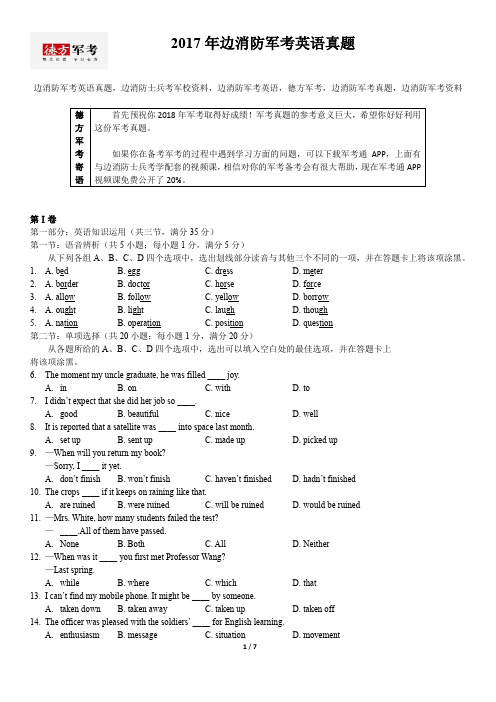
2017年边消防军考英语真题边消防军考英语真题,边消防士兵考军校资料,边消防军考英语,德方军考,边消防军考真题,边消防军考资料第Ⅰ卷第一部分:英语知识运用(共三节,满分35分) 第一节:语音辨析(共5小题;每小题1分,满分5分) 从下列各组A 、B 、C 、D 四个选项中,选出划线部分读音与其他三个不同的一项,并在答题卡上将该项涂黑。
1. A. bed B. egg C. dress D. meter2. A. border B. doctor C. horse D. force3. A. allow B. follow C. yellow D. borrow4. A. ought B. light C. laugh D. though5. A. nation B. operation C. position D. question第二节:单项选择(共20小题;每小题1分,满分20分)从各题所给的A 、B 、C 、D 四个选项中,选出可以填入空白处的最佳选项,并在答题卡上 将该项涂黑。
6. The moment my uncle graduate, he was filled ____ joy.A. inB. onC. withD. to7. I didn ’t expect that she did her job so ____.A. goodB. beautifulC. niceD. well8. It is reported that a satellite was ____ into space last month.A. set upB. sent upC. made upD. picked up9. —When will you return my book?—Sorry, I ____ it yet.A. don ’t finishB. won ’t finishC. haven ’t finishedD. hadn ’t finished10. The crops ____ if it keeps on raining like that.A. are ruinedB. were ruinedC. will be ruinedD. would be ruined11. —Mrs. White, how many students failed the test?—____.All of them have passed.A. NoneB. BothC. AllD. Neither12. —When was it ____ you first met Professor Wang?—Last spring.A. whileB. whereC. whichD. that13. I can ’t find my mobile phone. It might be ____ by someone.A. taken downB. taken awayC. taken upD. taken off14. The officer was pleased with the soldiers ’ ____ for English learning.A. enthusiasmB. messageC. situationD. movement15.—I don’t think the book is as interesting as you told us.—You will never know ____ you finish reading it.A.sinceB. unlessC. ifD. though16.—Must we finish the work before dark, sir?—No, you ____. But you ____tomorrow.A.needn’t; mustB. mustn’t; mustC. needn’t; needD. mustn’t need17.The police ____ having a meeting when the accident happened.A.areB. isC. wereD. was18.No one knew the reason ____ he kept silent about the problem.A.whichB. whyC. whatD. how19.—How is your recent trip to Beijing?—____ a more pleasant trip like that.A. Never have I hadB. Never had I hadC. Never I have hadD. Never I had had20. She felt quite ____, for it was the first time for her to speak in front of so many people.A. seriousB. humorousC. famousD. nervous21. —I’m sorry for my forgetting ____ the light last night.A. turning offB. turned offC. to turn offD. turn off22. This dictionary is ____ our English teacher introduced to us last week.A. itB. thatC. oneD. the one23. The policeman said to the thief, “You ____ return all the money to the old woman.”A. shallB. canC. willD. need24. —____ does it usually take to train the new soldiers?—About three months.A.How oftenB. How longC. How soonD. How far25.It is difficult for him to decide ____ he should refuse her help or not.A. whatB. whichC. whyD. whether第三节:完形填空(共10小题;每小题1分,满分10分)阅读下面短文,掌握其大意,然后从各题所给的A、B、C、D四个选项中,选出最佳选项,并在答题卡上将该项涂黑。
士兵军校考试《英语》—代词考点归纳总结(2)

士兵军校考试《英语》—代词考点归纳总结(2)关键词:军校考试张为臻军考大纲军校考试培训士兵军考军考英语考点this和these指在时间或空间上较近的人或者事物,that和those指在时间或空间上较远的人或者事物。
例如:This is a pen and that’s an eraser.这是一支笔,那是块橡皮擦。
This is a boy and those are girls.这是个男孩,那些是女孩。
指示代词所指的对象取决于说话者和听话者共同熟悉的语境。
如:I liked this movie today better than that concert last night.我喜欢今天的这个电影,胜过昨晚的那个音乐会。
指示代词具有名词和形容词性质,既可指人也可指物。
但是在相当于名词时一般指物多于指人。
如:I found this wallet. I found this.我找到了这只皮夹子。
我找到了这个。
(this 等于 this wallet)Is she going to marry that man?她打算跟那人结婚吗?(that man不得用that代替,否则有轻蔑之意)相当于名词的指示代词在句中作主语时,则指物指人均可。
如:What are these?那些是什么?(指物)This is Bill. Is that George?我是比尔。
你是乔治吗?(电话用语)(指人)打电话过程中,介绍自己时通常用this指代“我”,不用代词I;询问对方时用that指代“你”,不用代词you。
例如:----Hello. This is Mary. Who’s that?喂,我是玛丽。
你是谁?----This is Tom. 我是汤姆。
当指示代词所指的事物已确定时,后面的指示代词则用it或they代替。
如:This (suit) is expensive, isn't it? 这套衣服昂贵,不是吗?"Are those yours?""Yes, they are." “那些是你的吗?”“是的,它们是我的。
(完整版)定语从句知识点整理及相应练习.doc
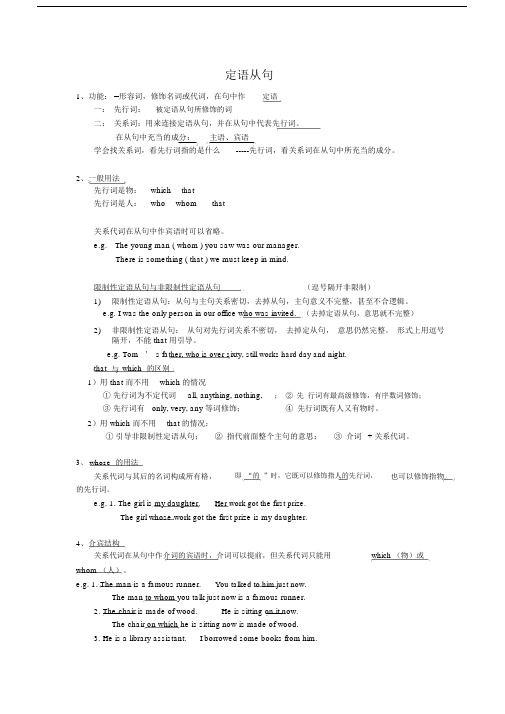
定语从句1、功能: =形容词,修饰名词或代词,在句中作定语一:先行词:被定语从句所修饰的词二:关系词:用来连接定语从句,并在从句中代表先行词。
在从句中充当的成分:主语、宾语学会找关系词,看先行词指的是什么-----先行词,看关系词在从句中所充当的成分。
2、一般用法先行词是物:which that先行词是人:who whom that关系代词在从句中作宾语时可以省略。
e.g. The young man ( whom ) you saw was our manager.There is something ( that ) we must keep in mind.限制性定语从句与非限制性定语从句(逗号隔开非限制)1)限制性定语从句:从句与主句关系密切,去掉从句,主句意义不完整,甚至不合逻辑。
e.g. I was the only person in our office who was invited.(去掉定语从句,意思就不完整)2)非限制性定语从句:从句对先行词关系不密切,去掉定从句,意思仍然完整。
形式上用逗号隔开,不能 that 用引导。
e.g. Tom’ s father, who is over sixty, still works hard day and night.that 与which 的区别1)用 that 而不用which 的情况①先行词为不定代词all, anything, nothing,;②先行词有最高级修饰,有序数词修饰;③先行词有only, very, any 等词修饰;④ 先行词既有人又有物时。
2)用 which 而不用that 的情况:①引导非限制性定语从句;② 指代前面整个主句的意思;③ 介词+ 关系代词。
3、 whose 的用法关系代词与其后的名词构成所有格,即“的”时,它既可以修饰指人的先行词,也可以修饰指物的先行词。
e.g. 1. The girl is my daughter. Her work got the first prize.The girl whose work got the first prize is my daughter.4、介宾结构关系代词在从句中作介词的宾语时,介词可以提前,但关系代词只能用which (物)或whom (人)。
定语从句知识点归纳
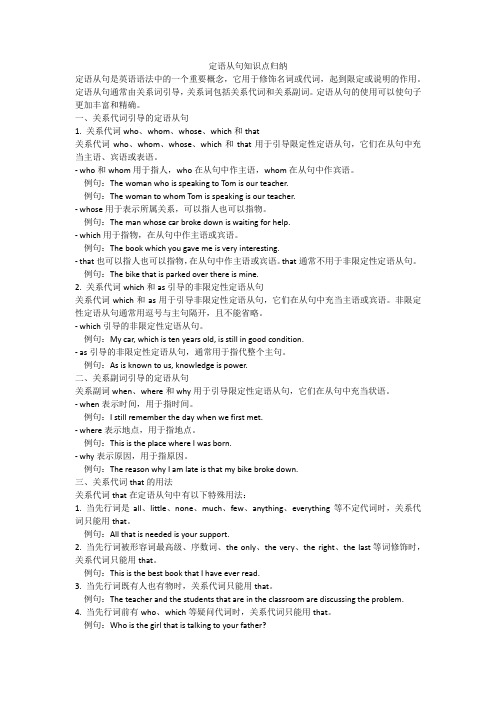
定语从句是英语语法中的一个重要概念,它用于修饰名词或代词,起到限定或说明的作用。
定语从句通常由关系词引导,关系词包括关系代词和关系副词。
定语从句的使用可以使句子更加丰富和精确。
一、关系代词引导的定语从句1. 关系代词who、whom、whose、which和that关系代词who、whom、whose、which和that用于引导限定性定语从句,它们在从句中充当主语、宾语或表语。
- who和whom用于指人,who在从句中作主语,whom在从句中作宾语。
例句:The woman who is speaking to Tom is our teacher.例句:The woman to whom Tom is speaking is our teacher.- whose用于表示所属关系,可以指人也可以指物。
例句:The man whose car broke down is waiting for help.- which用于指物,在从句中作主语或宾语。
例句:The book which you gave me is very interesting.- that也可以指人也可以指物,在从句中作主语或宾语。
that通常不用于非限定性定语从句。
例句:The bike that is parked over there is mine.2. 关系代词which和as引导的非限定性定语从句关系代词which和as用于引导非限定性定语从句,它们在从句中充当主语或宾语。
非限定性定语从句通常用逗号与主句隔开,且不能省略。
- which引导的非限定性定语从句。
例句:My car, which is ten years old, is still in good condition.- as引导的非限定性定语从句,通常用于指代整个主句。
例句:As is known to us, knowledge is power.二、关系副词引导的定语从句关系副词when、where和why用于引导限定性定语从句,它们在从句中充当状语。
2017年士兵军考英语考点归纳:定语从句(二)
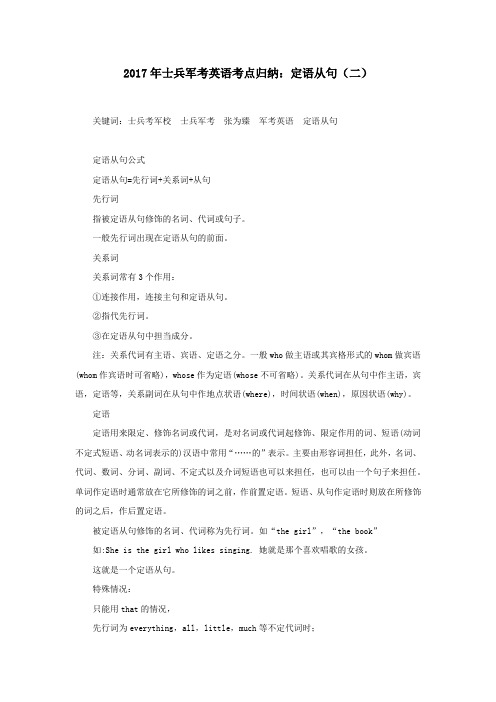
2017年士兵军考英语考点归纳:定语从句(二)关键词:士兵考军校士兵军考张为臻军考英语定语从句定语从句公式定语从句=先行词+关系词+从句先行词指被定语从句修饰的名词、代词或句子。
一般先行词出现在定语从句的前面。
关系词关系词常有3个作用:①连接作用,连接主句和定语从句。
②指代先行词。
③在定语从句中担当成分。
注:关系代词有主语、宾语、定语之分。
一般who做主语或其宾格形式的whom做宾语(whom作宾语时可省略),whose作为定语(whose不可省略)。
关系代词在从句中作主语,宾语,定语等,关系副词在从句中作地点状语(where),时间状语(when),原因状语(why)。
定语定语用来限定、修饰名词或代词,是对名词或代词起修饰、限定作用的词、短语(动词不定式短语、动名词表示的)汉语中常用“……的”表示。
主要由形容词担任,此外,名词、代词、数词、分词、副词、不定式以及介词短语也可以来担任,也可以由一个句子来担任。
单词作定语时通常放在它所修饰的词之前,作前置定语。
短语、从句作定语时则放在所修饰的词之后,作后置定语。
被定语从句修饰的名词、代词称为先行词。
如“the girl”,“the book”如:She is the girl who likes singing. 她就是那个喜欢唱歌的女孩。
这就是一个定语从句。
特殊情况:只能用that的情况,先行词为everything,all,little,much等不定代词时;先行词被all,every,no,any,some,little,much,one修饰时;先行词被the only,the very,the same,the last修饰时;先行词被序数词或形容词最高级修饰时;先行词是be的表语或there be 的主语时;先行词有人又有物时;当主句是以who或which开头的特殊疑问句时。
不能用that的情况介词前置时;非限定性定语从句中先行词本身是that多用who,不用that的情况先行词为anyone,one,ones时;先行词为those,he和people时;这些词代替指人,whom在定语从句中指人,"who"和“that”既可作主语又可作宾语(作宾语可以省略,who作宾语变为whom),that可以指人也可以指物, who不可指物。
士兵军校考试《英语》—形容词考点总结(2)
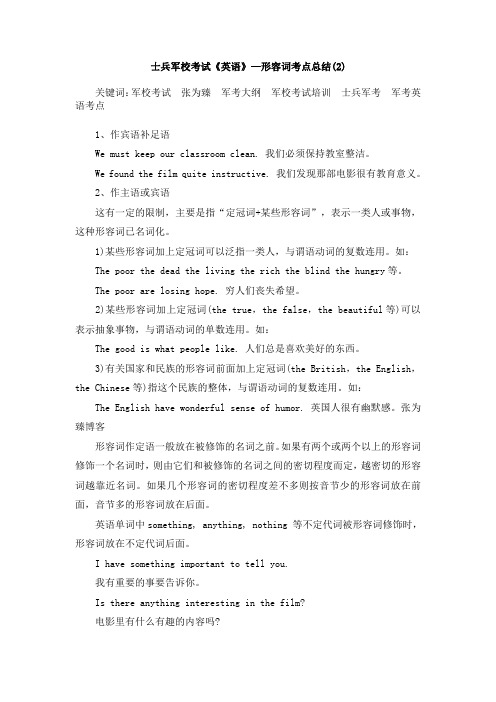
士兵军校考试《英语》—形容词考点总结(2)关键词:军校考试张为臻军考大纲军校考试培训士兵军考军考英语考点1、作宾语补足语We must keep our classroom clean.我们必须保持教室整洁。
We found the film quite instructive.我们发现那部电影很有教育意义。
2、作主语或宾语这有一定的限制,主要是指“定冠词+某些形容词”,表示一类人或事物,这种形容词已名词化。
1)某些形容词加上定冠词可以泛指一类人,与谓语动词的复数连用。
如:The poor the dead the living the rich the blind the hungry等。
The poor are losing hope.穷人们丧失希望。
2)某些形容词加上定冠词(the true,the false,the beautiful等)可以表示抽象事物,与谓语动词的单数连用。
如:The good is what people like.人们总是喜欢美好的东西。
3)有关国家和民族的形容词前面加上定冠词(the British,the English,the Chinese等)指这个民族的整体,与谓语动词的复数连用。
如:The English have wonderful sense of humor.英国人很有幽默感。
张为臻博客形容词作定语一般放在被修饰的名词之前。
如果有两个或两个以上的形容词修饰一个名词时,则由它们和被修饰的名词之间的密切程度而定,越密切的形容词越靠近名词。
如果几个形容词的密切程度差不多则按音节少的形容词放在前面,音节多的形容词放在后面。
英语单词中something,anything,nothing等不定代词被形容词修饰时,形容词放在不定代词后面。
I have something important to tell you.我有重要的事要告诉你。
Is there anything interesting in the film?电影里有什么有趣的内容吗?There is nothing dangerous here.这儿一点都不危险。
【最新版】专升本士兵军考英语知识点讲解大全

最新版专升本士兵军考英语知识点讲解大全
高中军考助航
英语
师之航军考教育◎编写
目录
第一章 名词..................................................................................................................................................... 1 主要内容...................................................................................................................................................1 第一课 名词及其数.................................................................................................................................1 第二课 名词的所有格.............................................................................................................................3 章节训练...................................................................................................................................................5
部队考军校统考英语常考词汇复习(含复习建议)

部队考军校统考英语常考词汇复习(含复习建议)第一篇:部队考军校统考英语常考词汇复习(含复习建议)部队考军校统考英语常考词汇复习agree vi.同意;持相同意见I cannot agree with you on this point.在这一点上,我不能同意你的意见。
sb agree with sb 同意某人的话,意见sth agree with sb 某物,某事适应某人 agree to sb 建议 agree on sth 在某一点上取得一致意见agree up sth 在某一点上取得一致意见 agree to do sth 同意干某事break vt.打破;损坏;破坏 We should all take a little break before dessert.吃甜点之前我们大家应该稍微休息一下。
break down 机器坏了=go wrong 身体垮了/终止谈话 11)I had never seen a grown man break down and cry.我从未曾看到过一个这么强壮的汉子痛哭失声。
break in 闯入,插话 break off 忽然停止讲话/断绝,结束/暂停工作,休息break out(战争等)爆发;逃出(无被动式)break through 打破包围break up 驱散,学校的放学 The police had to employ force to break up the crowd.警察不得不使用武力驱散人群。
break away from 脱离,逃说,与...断绝来往/改变某种习惯bring vt.拿来;带来;取来 I'll bring some of my pictures into the gallery.我就带一些我的摄影到艺廊来。
bring about =cause, result in, lead to bring down 使倒下,使下降 bring force 使产生,引起bring forward 提出建议=put forward/提前bring in =get in the pops/使得到某种收入Mr.Li: Oh… would you kindly allow me to bri ng in h… would you kindly allow me to bring in the civet durian? It is the favorite of my sister.李先生:喔…您能允许我带些榴莲吗?它是我姐姐最喜欢的水果。
2017年士兵军考英语考点归纳:表语从句(二)
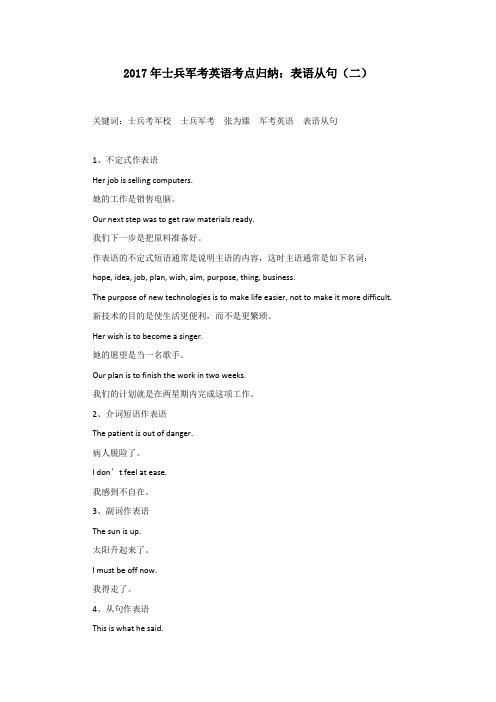
2017年士兵军考英语考点归纳:表语从句(二)关键词:士兵考军校士兵军考张为臻军考英语表语从句1、不定式作表语Her job is selling computers.她的工作是销售电脑。
Our next step was to get raw materials ready.我们下一步是把原料准备好。
作表语的不定式短语通常是说明主语的内容,这时主语通常是如下名词:hope, idea, job, plan, wish, aim, purpose, thing, business.The purpose of new technologies is to make life easier, not to make it more difficult. 新技术的目的是使生活更便利,而不是更繁琐。
Her wish is to become a singer.她的愿望是当一名歌手。
Our plan is to finish the work in two weeks.我们的计划就是在两星期内完成这项工作。
2、介词短语作表语The patient is out of danger.病人脱险了。
I don’t feel at ease.我感到不自在。
3、副词作表语The sun is up.太阳升起来了。
I must be off now.我得走了。
4、从句作表语This is what he said.这就是他所说的话。
表语从句的注意事项A表语从句一定要用正常语序。
False: The question is when can he arrive at the hotel.Right: The question is when he can arrive at the hotel.B引导名词性从句时if/whether(是否)用法辨析:if不能引导表语从句,只能用whether 来引导。
引导宾语从句时if/whether可以互换,但介词后面的宾语从句只能用whether来引导。
英语语法基础: 定语从句详解

语法定语从句Q1: 什么是定语从句?定语从句是由关系词引导的从句,而这类从句在句中作定语,修饰句中的名词或代词的从句,其中被修饰的名词或代词为先行词。
Do you remember the girl who taught us English?关系词:分为关系代词和关系副词。
先行词:被修饰的名词或代词为先行词。
Q2: 区分关系代词和关系副词?关系代词(that, who,whom, whose, which)所代替的先行词是人或物的名词或代词,并在定语从句中充当主语、宾语、定语等成分。
◆Is he the man who/that wants to see you? (who /that在从句中作主语,指人)◆He is the man whom/ that I saw yesterday.(whom / that在从句中作宾语,指人)◆They rushed over to help the man whose car had broken down.(whose在句中作定语,指人)◆Please pass me the book whose cover is green. (whose在句中作定语,指物。
还可以同of which互换)◆The package which /that you are carrying is about to come unwrapped.你拿的包快散了。
(which / that在句中作carry的宾语,指物)◆Kim Cobb, a professor at the Georgia Institute of Technology in Atlanta, is one of a small but growing minority of academics who/that are cutting back on their air travel because of climate change.◆In ancient China lived an artist whose paintings were almost lifelike.关系副词(when, where, why, that)可代替的先行词是时间、地点或理由的名词,在定语从句中作状语。
2017年军考大纲之英语考点:主、谓、宾语

2017年军考大纲之英语考点:主、谓、宾语1、主语定义:主语是句子陈述的对象,同汉语的主语。
2、哪些词可以充当主语(1)名词例如:A mooncake is a delicious,round cake.月饼是一种美味的圆饼。
The first truck is carrying a few baskets.第一辆卡车是带着一个竹篮。
(2)代词例如:It’s a young forest.这是一个年轻的森林。
I don’t know if it will grow.我不知道它是否会增长。
(3)数词例如:One and two is three.一加二等于三One is not enough for me. I want one more.一个对我来说是不够的。
我想再要一个。
(4)不定式(常以It’s adj. to do sth. 形式出现)例如:To give is better than to receive=Its better to give.给予比接受更好。
I found it’s difficult to get to sleep.我发现晚上很难入睡。
(5)It 作主语,有如下情况:①指代刚刚提到的事物:What’s this? It’s a bus.(指代what)这是什么?它是一辆公共汽车。
士兵军考,张为臻博客。
②指代一个你不知道或判断不清性别的人:Who’s knocking the door? It’s me. (指代who)谁敲门?是我。
Who’s the baby in the picture?It’s my sister. (指代who)这幅画里的婴儿是谁?是我的妹妹。
③表示时间,天气,距离:What’s the time? It’s eight o’clock. (时间)什么时间了?八点了。
What’s it going to be tomorrow?It’s going to be rainy.(天气)明天是什么天气?将是雨天。
初中英语定语从句语法及考点归纳

初中英语定语从句语法及考点归纳定语从句定语从句(Attributive Clauses)通常皆放在它所修饰的名、代词之后,这种名、代词就叫做先行词。
引导定语从句的关联词为关系代词和关系副词。
1.关系代词引导的定语从句在下面几种情况下必须用关系代词that引导定语从句:(1)先行词是不定代词all ,few, little, everything ,nothing anything,none等。
如:Is there anything that you want to buy in the shop?你在商店里有什么东西要买吗?(2)先行词被序数词或形容词最高级所修饰,或本身是序数词、基数词、形容词最高级。
如:This is the best movie I’ve ever seen.这是我看到过的最好的一部电影。
(3)先行词被all, any ,every ,each, few, little, no ,some等润饰时。
如:I have read all the books(that )you gave me.我读了你给我的一切的书。
(4)先行词被the only , the every ,the same, the last修饰时。
如:He is the only person that I want to talk to .他就是我要谈话的那个人。
(5)当并列的两个先行词分别透露表现人和物时。
如:They are talking about things and persons that they remembered.他们在评论他们所能回想起来的人和事。
(6)为避免重复,在以who或which开头的特殊疑问句中。
如:Who is the girl that is crying ?正在哭泣的那个女孩是谁?Which of the books that borrowed from the library is yours从藏书楼借的哪一本书是你的?(7)用作关系代词,修饰表示时间的名词如day, time , moment代替when。
高考英语定语从句考点总结最全面精华版

高考靠近仍为英语犯愁?这里有份连老外都点赞地定语从句技巧高考必胜在这个穷得只剩下梦的时候你一定要比别人更努力,概念在复合句中,修饰名词或代词地从句叫定语从句;引导定语从句地词叫关系词; 被修饰地名词或代词叫先行词;定语从句一般放在先行词地后面;二,引导词(1)关系代词:that/who/whom/which/as(2 )关系副词:when/where/why三,分类依据定语从句与先行词地关系,定语从句可分为限制性定语从句及非限制性定语从句;1,限制性定语从句紧跟先行词,主句与从句不用逗号分开,从句不行省去;例如:Any man that / who has a sense of duty won ' t do such a thing.任何有责任感地人都不会做这样地事;2,非限制性定语从句主句与从句之间有逗号分开,起补充说明作用,如省去,意思仍完整;例如:The house,which we bought last month,is very nice.这幢房子很美丽,为我们上个月买地.留意:非限定性定语从句中不能使用关系代词that ;.F 1> 尸A,G & A4ENGLISH >R b 卜 Q £ ° L♦四,关系代词地用法1,that:可指人或物;在定语从句中作主语,宾语,表语;(指人时,相当于who 或whom;指物时,相当于which)(一般不用于非限制性定语从句;不行置于介词后作宾语)如:(1) A letter that/which is written in pencil is difficult to read.(主语)(2)Do you know the gentleman that/who spoke just now.(3)You can take anything ( that) you like.(宾语)(4)What is the question (that/which) they are talking about.(5)Here is the man ( who/whom/that ) you want to see.(6)She's no longer the girl ( that) she used to be before.(表语)(6)Our hometownis no longer the one (that) it used to be.= Our hometown is not the same as it used to be.= Our hometown is different from whatit used to be.= Our hometown is not what it used to be.2,which:指物;在定语从句中作主语,宾语,表语,定语;如:(1)The book which/that was on the desk was bought by my father.(主语)(2)2. The book (which/that) I bought yesterday is very interesting.(宾语)(3)The factory in which his father works is far from here.(4)He was proud, which his brother never was.(表语)(5)Tom spent four years in college, during which time he learnedFrench.(定语)(6)He may be late, in which case we ought to wait for him.3,who, whom, whose:who:主格,在从句中作主语,在口语或非正式用法中作宾语;只可指人whom:宾格,在从句中作宾语;只可指人whose:属格,在从句中作定语,可指人也可指物;(1)I like the students who/that work hard.(主语)(2)All who heard the story were amazed.(代词如he, they, any, those, all, one 等后多用who.)(3)Chaplin, for whom life had once been very hard, was a success as an actor.(宾语)(4)He's a man from whom we should learn. = He's a man (whom/who/that) we should learn from. -I比较: He is the student whom you think to be worthy of your praise.He is the student who you think is worth praising.(5) A child whose parents are dead is called an orphan.(指人)I'd like a room whose window faces south.(指物)=I'd like a room of which the window faces south. =I'd like a roomthe window of which faces south.There is a teapot shaped like a Chinese duck, out of whose mouth tea is supposed to come关系代词作介词宾语:关系代词在定语从句中用作介词宾语时,介词可放于从句之首,也可放于从句之末.但以放于句首较为正式.(介词前置,必需留意不影响动词词组地含义;关系代词who 与that用作介词宾语时,介词必需放在句末.)如:(6)This is the book for which you asked.=This is the book (that/which) you asked for.(2)Doyou knowthe person with whomI shook hands.= Doyou knowthe person(whom/who/that) I shook hands with. I(3)The beginning of agriculture was a big step in human progress with which nothing could compare until our information age. I(4)In the dark street, there wasn't a single person to whom she could turn for help.Is this the factory to which you paid a visit last week.Is this factory the one to which you paid a visit last week.(5)This is the girl whom they are looking after.(介词after 与look构成固定词组,不行前置;再如:look at, look for, look after, take care of等)4,as地用法:(as引导定语从句,在定语从句中作主语,宾语,表语)(1)如为限制性地,多用于the same as ; the same as;such as ; as many/much as;so as 等结构中;如:I have the same book as you (have). 我有一本与你地一样地书;Her attitude to him was quite the same as it had always been.(关系代词as与指示代词same连在从句中用作表语,先行词为same.)用,Why didn't you mention that in face of the police just now.I thought it was such a minor detail as was hardly worth mentioning.We will only discuss such problems as have something to do with our own interests.Don't do such things as you are not sure about.There is no such place as you dream of in all this world.比较:I live in the same house that he used to live in.I'm wearing the same shirt as you wore yesterday.比较:Here is so big a stone as no one can lift.(定语从句)Here is so big a stone that no one can lift it.(结果状语从句)(2)如为非限制性地,多单独引导一个定语从句,这种定语从句可置于句首,句中或句尾,译为"正如,这一点";(动词常为know, see, expect, point out, etc.)As we all know, smoking is harmful to one's health . (as 作宾语)=As is known to all, smoking is harmful to one's health . (as 作主语)=It's knownto all that smoking is harmful to one's health. 或:Smoking is harmful to one's health , as we all know .(as 作宾语)或:Smoking, as we all know, is harmful to one' health. IHe was a foreigner, as I knew from his accent.(宾语,先行词为前面整个句子)5,but地用法:but用作关系代词,其意思相当于who/that not ,"没有不",如(1)There is not one of us but wishes to help you.(2)There is no tree but bears some fruit.(3)There are very few but admire his talents.五,关系副词地用法1,when指时间,其先行词表示时间,在句中作时间状语;例如:This was the time when he arrived.这为他到达地时间;(when=at which)2,where指地点,其先行词表示地点,在句中作地点状语;例如:This is the place where he works.这为他工作地地点;(where=at /in which)3,why指缘由,其先行词为缘由,起缘由状语作用;例如:Nobody knows the reason why he is often late for school. 没人知道他为什么上学总迟到;(why=for which)。
2017年士兵军校考试英语考试大纲:英语作文万能模板之段尾句
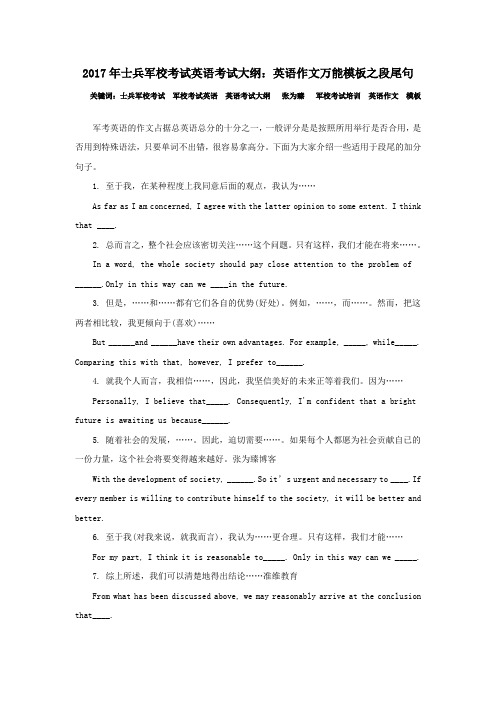
2017年士兵军校考试英语考试大纲:英语作文万能模板之段尾句关键词:士兵军校考试军校考试英语英语考试大纲张为臻军校考试培训英语作文模板军考英语的作文占据总英语总分的十分之一,一般评分是是按照所用举行是否合用,是否用到特殊语法,只要单词不出错,很容易拿高分。
下面为大家介绍一些适用于段尾的加分句子。
1. 至于我,在某种程度上我同意后面的观点,我认为……As far as I am concerned, I agree with the latter opinion to some extent. I think that ____.2. 总而言之,整个社会应该密切关注……这个问题。
只有这样,我们才能在将来……。
In a word, the whole society should pay close attention to the problem of ______.Only in this way can we ____in the future.3. 但是,……和……都有它们各自的优势(好处)。
例如,……,而……。
然而,把这两者相比较,我更倾向于(喜欢)……But ______and ______have their own advantages. For example, _____, while_____. Comparing this with that, however, I prefer to______.4. 就我个人而言,我相信……,因此,我坚信美好的未来正等着我们。
因为……Personally, I believe that_____. Consequently, I'm confident that a bright future is awaiting us because______.5. 随着社会的发展,……。
因此,迫切需要……。
如果每个人都愿为社会贡献自已的一份力量,这个社会将要变得越来越好。
军队院校士兵高中英语 高频短语总结 1

高频短语总结act on 对……起作用;按照……行动add up to 合计达到……adjust oneself to 使自己适应于……admit of 容许有……advertise for 登广告寻求、寻找……aim at 瞄准、针对……allow for 考虑到……,体谅……allow of 容许,容得……amount to 相当于、等于……answer for 负责、保证……apply to sb. for sth. 请求某人……argue with/against sb. about / on sth. 与某人辩论某事argue sb. into / out of doing sth. 说服某人做或不做某事arise from 由……而产生、而引起ask for 请求……;向……要……;通过询问找……assist sb. with sth. / in doing sth. 帮助某人做某事awake to 认识到……bargain on doing sth. 商定做某事beg…of sb. 请求某人……beg for 乞求……believe in 信任……belong to 属于……belong in / with /……应归于某类别、派别等bid…to sb. 向某人表示……bother…about sb. 为……烦扰break in 闯入,打断break in on 打扰、打断break off 折断;突然停止讲话;断绝break out 战争、火灾等突然发生…borrow sth. from / of sb. 向某人借……break up 打碎,破碎;分裂;学校期末分散bring about 造成、带来……bring sb. back to 使某人恢复到……bring in 生产,产出;引进风尚等bring off 使成功;完成……break up 打碎,破碎;分裂;学校期末分散bring about 造成、带来……bring sb. back to 使某人恢复到……bring in 生产,产出;引进风尚等bring out 使呈现出……;说出……bring through 救活,使……渡过难关build on 依赖、依靠……;把……建立于……build up 树立、逐步建立……call for 需求、需要;为争取……而叫喊call off 叫走……,把……叫开去call on 约请、指派……;号召、呼吁……call up 召唤、传讯……;使人想起……care for / about 关心、担心、介意、计较……carry away 运走、拿走……bring off 使成功;完成……carry on 把……进行下去;坚持下去carry out 突现、开展……;执行、贯彻……catch at 死命抓住……;渴望取得……catch up with 赶上、追上……centre ( …) on / upon (把……)集中于……change…for…用……去换……;换车、船到……change…into…把……变成……charge sth. upon sb. 把……归咎于某人cheat sb. of sth. 骗取某人的……cheat sb. into…哄骗某人……cheat sb. into…哄骗某人……check up 核对……,检验……;检查……check up with 与……相符合choose…from / among / out of从……中挑选……claim sth. from / of sb. 要求某人……clash into…猛撞在……clean out (把……)打扫干净、清除出去clean up (把……)收拾整洁,打扫干净clean up on 击败……,胜过……clear off 清除……;摆脱烦恼等;走开clear up 整理、清除……;解除误会等climb down 从……爬下;退让,服输、屈服close down 工厂等关闭;(电台)停止播音close with 靠近……,逼近……;接受……come about 发生come in for 接受遗产等;受到处分等come out of 由……出来、产生come out with发表、公布……;说出、提出……come through 经历困难等;经历……而活着come to ( oneself )(昏迷后)醒过来;醒悟过来come up against 碰到困难、反对等come up to 达到、符合……come up with 赶上……;提出……compare…with…把……和……比较confirm sb. in his + n. (在信念等方面)使……更坚定conflict with 与……斗争、战斗conform ( …) to / with 与……一致、符合;使……遵照……consist of 由……构成consist in 存在于……consult with 同……商量、协商cover sb. / sth. with 把……对准某人;用……覆盖……crash to / into 猛撞在……;猛然倒下、坠落crowd…with persons/persons to…某处挤满了人cry for 因……而叫喊、流泪cry over sth. 为……而流泪、悲伤cure sb. of his + n. 治愈某人某种疾病cut in 插嘴;把……插进……cut off 切掉、删去……;切断……;关掉马达等cut sb. to 刺穿某人至……;伤害某人感情……deal with 处理、安排……;对付、应付……debate about sth. 争论某事decide on 决定、选定……declare ( …) for ( on )/ against 表态支持或反对……deliver sth. to sb. 把……交付给某人demand sth. of / from sb. 要求某人……depend on / upon…( for …)(为……)而依靠、依赖……deposit sth. with sb. 把……寄放在某人处deprive sb. of sth. 夺去、剥夺某人的……derive ( …) from…(从……)取得……;由……而来design sth. for 为……指定、预定……devote sth. to (+ v-ing )把……专用于(去做)……die of / from 死于疾病等die for 为……而死die away / out / down 变弱;平息;消失等differ from sth. 和……有区别、差别;和……不同differ from sb. on / about sth.在……与某人意见不同discuss sth. with sb. 与某人讨论……divide…from…把……从……隔离开divide sth. with sb. 和某人共同承担do away with废除、去掉……;弄死、干掉……do with sb. 与某人相处doubt about / of sth. 对……怀疑drag sb. into 把某人拖进……drain sth. away / off 排去……的水或其他液体draw away 拉开、离开draw off 脱去手套等;排去多余的水;撤退draw to 向……移动;逼近draw with 追上……dream of / about sth. 梦到(见)……dream of + v-ing ( phr )渴望、向往做……dream away / out / through因空想而虚度时间等drink sth. off / up / down 把……一饮而尽drive away at sth. 努力做……drive…into…把……迫使、驱使到……drop away / off (一个一个地)离去;逐渐减少drop in on sb. 顺便走访某人dwell at / in 留居、寓于……dwell on / upon 细想、详细讲述……ease sb. of his + n. 消除某人……ease off / up 减轻、放松eat away sth. 继续吃下去;把……蚕食掉eat up 把……吃完;耗尽……;吞灭……elect sb. to 推选某人到某岗位empty sth. of sth. 把……从……排空、倒空end in 以……为结果end off 结束……end up by / with 最后以……结束enlarge on / upon 详述……ensure sb. from/against sth. 保护某人免受……ensure to / for sb. sth. 保证给某人、赋予某人……enter sb. at / for 把某人送进……;使某人参加……equip…for…为……装备……equip sth. with 用……装备……escape from 从……逃跑、逃脱;从……漏出、流出examine sb. in 考查某人的……examine into 调查、细查……exceed in 在……领先exchange sth.for sth. 把……换成……exchange sth. with sb. 与某人交换……face up to 勇敢地对付……fail in +/ v-ing ( phr. )在(做)……失败fall in with 同意……fall off 下降;变坏;离开,叛离fall out 争吵;结果如何;离队fall out of 放弃习惯等fasten sth. on / upon sb. 把罪名等强加于某人fear for sth. 为某人的……担忧feed on sth. 以……为食物、为能源feed sth. to…用……喂……feed…with…向……供给……feel for sb. /sth. 同情某人;摸索找某物feel like + v-ing ( phr. )想要做……fight against / with 向……斗争fight off 击退……;竭力避免……fight with 与……战斗、斗争figure on + v-ing ( phr. )打算、计划做……figure on one's + v-ing ( phr. )指望某人做……figure out at 合计为多少钱fill ( sth. ) with 用……(把……)填满、装满find sth. for sb. 为某人找……find out 找出、发现……;查明真相等finish up with 以……结束;最后有……fit sb. to 使某人适应……fit in with 适合、符合……;适应……fly into 突发、忽发……fly up to 向上飞到……fold about / round 交叠、合拢fold up 垮掉;放弃;倒闭foldup into 折叠起来成……follow out 贯彻、执行……;把……探究到底follow up sth. with 用继续行动等加强……的效果fool sb. into + v-ing ( phr. )哄骗某人做……fool sb. out of sth. 诈骗某人的……force sb. into + v-ing ( phr. )强迫某人做……forgive sb. for + v-ing ( phr. )原谅某人做的事gain on / upon 跑得比……快;超过……gain sb. over 把某人争取到自己一边get along with 和某人相处get away 逃脱、离开get away with 侥幸做成……;侥幸取走……get down on 对……产生恶感;开始不喜欢……get down to 开始认真对待、考虑……get off 脱衣服等;下车等;使动身;使开始get on 穿衣服等;上车等get on for 接近于……get on to 识破某人或某人的……get through with 完成……;花光钱财等get to 到达……get up 起床;使起立;登上……gift sb. with sth. / sth. to sb. 赠送……给某人give off 发出蒸气、光等give sth. to sb. 给某人……give up 放弃……;停止……;抛弃……give up sth. to sb. 把……让给某人glance at / over 粗略地看一下……;对……一瞥glare at / on 对……瞪眼,对……怒目注视glimpse at 瞥见……go about + to-v- ( phr. )着手干……go against 违反、反对……;不利用……go back on / upon / from 违背……;背叛……go by 走过;依照、按照……判断go for 为……去(请、找)……;被认为……go in at 痛打……;猛烈攻击……go in for 从事于……;酷爱、追求……go off with 拿去……,抡去、拐走……go on 继续下去(某种行为);发生、进行go over 对……润色;再读一遍……go with 和……一起去;与……持同一种意见graduate at / from 从何处、何系毕业grow on (习惯、感情等)加深对……影响grow out of 产生自……;变得不适合于……hand down 把……传下来hand in 把……交进、交上handle with (用手)搬运时要……hang on to 紧紧握住……hang over 挂在……上;靠近在……上hang up 把……挂起来;挂电话happen to …某人某物出了事happen on / upon sb. 巧遇、偶然发现某人have sb. down / in / up 把某人请来、请进做客( down :从城市请到乡下,up :从乡下请到城内) hear from 接到某人的信hear of / about 听说……hear sb. out 听某人把话讲完help sb. with 在……帮助某人help sb. off ( on ) with 帮某人脱去(穿上)……help sb. out 帮某人解决难题等hire on / out 接受雇用hold back 踌躇;阻止……;隐瞒消息等hold down 压制……;缩减……;牵制……hold in 约束……;抑制……hold out till 坚持到……时刻hold sth. over 将……延迟hurry away / off 匆忙离去hurry up 赶紧insure…against 给……保……险interact on 相互作用、影响(于……) interest sb. in sth. 使某人对……感兴趣introduce sth. into 把……引进、输入……introduce sb. to 把某人引荐给……invest in 投资于……invite sb. to 邀请某人到……invite sth. from sb. 征求某人的……join in 参加……judge by / from 以……判断judge of 对……作评价jump at 看到……时紧张、吃惊、喜悦而跃起jump for 为(因)……而跳跃jump from…to 突然从一话题跃到另一话题keep at 坚持做……;不停地做……keep away 站开;使离开keep…from (+ v-ing )阻止、抑制……做……keep up with 跟上、赶上……kick against / at 反对、抗议……;对……发牢骚kill off 消灭、杀光…kneel before / down / to 跪下,跪着knit sth. into 把……编成、编入……knock up against 同……冲突;偶然碰见know about/of …知道、了解、懂得……;听说know…from 区分……和……lag behind 落后于……land…at 把……送到……;使……到达land up at 在……歇脚last out 坚持;耐久laugh at 因……发笑;嘲笑某人laugh away 用笑来驱除烦恼等laugh down 用笑声打断……laugh over 笑着谈论……lead to 导致、引起……lead…( from…) to (从……)把……引到……lead sb. on + to v- ( phr. )诱使某人做……learn of 听说、听到……leave…alone 不管、不理……;不要动……leave…behind 留下、忘了带……;把……丢在后面leave off (+ v-ing )停止(做)……leave out 省去、略去……;不考虑leave over 留下、剩下……;使……延期leave sth. ( up ) to sb. 把……交付于某人leave sth. with sb. 把……交给某人lend…to 把……交给lend oneself to 帮助……;屈从……let ( …) down 放下、放低……;使……失望lie about sth. to sb. 就……对某人撒谎light up 点燃……;照亮……;使……变亮limit…to 把……限定在……line up 排队listen to 留神听……live by 靠……生活live off 住在……之外;靠……供养live on 以……为主食;继续活着live through 度过、经受住……live up to 实践誓言等;做到……;与……相等live with sb. 与某人同居;和……住在一起lock sb. in / out 把某人锁在……内或……外lock sth. away 把……锁藏起来look after 关心、照料……look at 看、查看……;考虑、着眼于……look back to / up 回顾……look down on/upon 看不起……look for 寻找……;期待……look forward to…/ v-ing 盼望(做)……look in ( on sb. )顺便去看(某人)look on sb. with 以……看待某人look on with sb. 和某人合读、合看……look out (+ for…)留心、当心、提防look through 看穿……make away 离去、逃去meet with 遇见、碰见……;遭受mention to sb. + that-cl 对某人讲起mistake…for 把……错认为……mix sth. with sth. 用……和……混合在一起mix up 搅匀、搅和……;混淆……move to 搬家、迁移到……nod sb. 向某人点头示意……open into / on / onto 通往、通向……operate on / upon sb. for 对某人的某疾病开刀operate ( sb. ) on 为某人某部位动手术operate to 对……起作用owe…to sb. 欠某人的……;把……归功于某人owe sb. for 因为……而欠某人(的……) pardon sb. for + v-ing ( phr. )因做……请某人原谅part from / with sb. 同某人分手、告别pass sth. to sb. 把……传给某人pass through 穿过、经过…pause on 在某方面、某点停止(暂停)pay down 用现金支付pay for 偿还……;受到……报应pay off 付清某人的工资、债务等pay sth. to sb. 向某人表示问候;访问某人等permit of 容许某事persuade sb. into + v-ing ( phr. )说服某人做……persuade sb. out of sth. 劝某人取消persuade sb. to sth. 劝某人使其同意……phone ( sth. ) to sb. 给某人打电话(告诉他……) pick out 挑出、选出……;区别出……;领会……pick over 在……挑选;分档挑选出……pick up 拾起、捡起……;偶然获得知识、信息等pick up on 与……熟悉起来place sth. on / in sb. 对某人寄予希望、信任plan on + v-ing ( phr. )打算做……play along with 参与……;与……合作play at 做游戏;参加比赛等;做事敷衍了事play at sb. in sth.用……和某人开玩笑、嘲弄某人等play out 把戏演完、比赛进行到play on / upon 不择手段地利用……play upon to 在演戏中和……配合得好;迎合……plug in 把塞子、插头塞入、插进……point/at / to / towards 指着、指向、面向……、暗示……point out 指出……possess sb. of sth. 使某人占有、具有post …over with 在……上面贴满了……pour out 涌出……;倾吐、诉说……practiseat 开业做(医生、律师等)practise in 练习……praise sb. for sth. 某人因……而受到赞扬等pray for sb. 为某人祈祷prepare for 为……准备prepare sb. for sth. 使某人对……有所准备prepare sth. for sth. 为……准备、预备……present sb. to sb. 引见某人见……press (+ sth. ) on sb. 把……强加于某人prevail on / upon / with sb. + v-ing ( phr. )劝说、说服、诱使某人做……prevail over 胜过……prevent sb. from + v-ing ( phr. )阻止某人做……print sth. on 使……牢记在……proceed against sb. for sth. 为……而对某人起诉proceed from 从……开始、着手;出自于profit by/from 从……中得益;利用……protect…from 保护……以免……turn 关小、调低……;拒绝……provide for 为……而准备;为……提供生计provide sth. for 为……提供……provide sth. with 为……装备……provoke sb. into + v-ing ( phr. )激起、惹得某人……pull about 把……拖来拖去;粗暴地对待pull away 脱身、离开pull down 拉倒;摧毁……;使……精神不振pull off 脱衣等;努力实现……pull out 拔出……;撤走……;渡过难关等pull sb. through 使某人渡过困难、危机等pull sth. on sb. 拔出刀、枪等对着某人pump sb. for sth. / sth. out of sb. 从某人处探出……purchase …with 用鲜血、牺牲、生命换得……push around 把……推来推去;烦扰、欺侮……push on to 努力向……推进、前进push on with 加紧于工作、学习等push sb. on 促使某人继续做下去push sb. over 把某人推倒put about 使……转向;散布……;麻烦……put aside 把……放在一边;储存……以备后用put…by 把……放在旁边;回避、忽视put down 放下……;拒绝……;镇压……;记录……put…down at / for 估计……;认为……put…down to 把……记在某人账上put forward 放出……;提出计划、理论等put in 放进……;使……就职;种植……put off 推迟……;搪塞……;脱掉……;扔掉put sb. off 使某人失去……;使某人分心等put out 放出、伸出……;生产、发布……;熄灭……put sb. on to 引起某人对……的注意put sb. through 使某人经受考验、训练put up 举起……;进行……;推举……;建造……put upon 欺骗……;使……成为牺牲品put up with 忍受……;容忍讨厌的人或事puzzle…about / over 对……为难、窘困qualify sb. for sth. 使某人对工作、职务等合格quarrel with sb. 和某人吵嘴、争吵quarrel with sth. / sb. 埋怨、责备……question sb. on sth. 就问题等而询间某人race with sb. 与某人赛跑raise sth. to sb. 向某人举起……range from…to从……变动到……(在……与……之间变动) reach for 伸手取、拿……read about / of 谈到、获悉……read out 宣告开除……;读出……read sth. through 把……从头读到尾reason sb. into sth. / v-ing ( phr. )劝说某人做……recall sb. to 使某人想起了……receive sth. from sb. 得到某人的……receive sb. into 接受某人加入……recommend sb. for 介绍、推荐某人加入……recover from 从……状态下恢复、复原reduce…to 把……减少到……refer to 谈到、提到、涉及……refer…to 把……归于……;认为……是……的起源reflect on / upon 思考、考虑、沉思……relate to 和……相处relate…to/with 使……与……联系;显示……与……的关系relieve sb. from 消除某人的……remember sb. to sb. 代……向……致意、问好remind sb. of 使某人想起、记起……remove sb. from从……把某人开除;撤某人的职rent at / for 租金多少钱rent sth. to / from 租(房子等)给……;向……租……repay sb. for 报答某人的……repeat sth. to 把(别人讲的话)传给……replace…by / with 用……取代、代替reply to 回答、回复……report of 说出对……的印象report on / upon 报告、汇报某事report to 向……报到request of sb. 恳求、请求某人……require of sb. 要求、命令某人……rescue sb. from 从……处、状况下营救某人research into 调查、探究…reserve sth. for 为……保存、储蓄……resign from 辞去……职务resort to 求助、凭借respond to 响应……;对……有反应rest on 视线停留在……;搁在……;依赖rest with 取决于……;归于……restore sb. to 使某人恢复到……result from 由……而产生、引起result in 引起、导致……retire from 从……退职、引退、隐居等retreat from 放弃……;从……退出return to 归还给……;话题等回复;恢复职务reward sb. for 为……而答谢某人ride in / on 乘、坐、骑……ring…about / in / round 包围、围拢……ring for 按铃、摇铃叫或要……rob sb. of sth 抢劫、劫掠某人的……root in 扎根于……rule out 排除、取消、拒绝考虑……run into 使……撞在……;偶然碰见某人sail for 船开向……sail into 船驶进……save sb. from 把某人从……救过来save sth. for 为……而节省,节约钱、时间等search for 搜寻、探查……secure …against 掩护、保护……以便see about 查看、查询……see after 照应、照顾……seek after / for 寻找、寻求、探索……seek out 搜寻出……;在……中挑出……seize sb. by 抓住某人的……select…from 从……中选出……sell at / for 出售几个/多少钱卖sell up 卖光……send…to 派遣……去、到……sentence sb. to 判某人……徒刑separate…from…把……和……分开、分离set about 开始、着手……;散布谣言……set against 使……得到补偿、平衡;和……对立set aside 留出、拨出……;略去……set down 放下……;使……下车;记下、记入……set off 出发、动身;使……爆炸;引起……set sb. off + v-ing ( phr. )使某人开始做……set up 竖立……;创办、开办……;提出……settle down to 安定下来专心于……settle with 和……取得谅解;与……清算;偿还……share sth. with sb. 和某人分享……shoot at 向……射击;为……而努力shout at sb. 对某人大声叫嚷、喊叫show off 卖弄,……;使……显眼show up 揭穿、揭露……;出席、到场shower on / upon sb. 阵雨(般)落在某人身上shower sb. with 给某人送大量的……shut down 使……关闭;关住窗户等shut off 关掉煤气等;切断……;使……隔绝shut up 关闭门窗等;关店;使……住口shut ( the door ) upon/against sb. 让某人吃闭门羹sign in 签到;记录某人到的时间sign on 签约工作、受雇用等sign to sb. + to-v ( phr. )以动作示意某人做……single out 挑选出、选拔出……sit down 坐下;扎营sit out 对……袖手旁观;坐在户外sit through 一直捱到……结束;看完……sit up 迟睡;熬夜sleep away / off 用睡眠熬过或度过……slow down / up 放慢……速度;变得呆痴smell of 散发……气味;有……的气味smile at 对……微笑;因……笑;对……冷笑speak in 用某种语言说speak of 听说……speak to sb. about sth. 责备某人的……specialize in在……受到专门训练;专门研究……stand up 站起;向上升起;站得住脚stand up for 拥护、支持……stand up to 经得起……start at 因……吃惊、惊起start out 起程;着手进行stay up 不睡觉step into 跨入、踏上……stick at / to 保留、坚持、固守……stop by / in 顺便访问某人study out研究出……;解决……;设计出……succeed in (+ v-ing )在……取得成功succeed to 继任、继承、接着发生……suffer for 因……而遭受恶果suffer from 患……病;受到……损害、侵害suit to / with 与……相称、协调sum up 总结,概述……supply sth. for sb. 为某人提供、供应supply…with 向……供应……support…with 用……支承、支撑……surprise sb. into (+ v-ing )出其不意地使某人做……take after 学……的样;面貌等像自己的父母take against 反对……;不喜欢……take away 拿走、夺去……;使……离开talk about 谈论……talk of + v-ing ( phr. )谈到要去做……talk sb. into / out of sth. 说明某人做、不做……taste of 有某种味道、气息tear sth. away from 从……夺走……telephone ( …) to sb. 用电话告诉某人(……) tell ( sb. ) about / of sth. 告诉(某人)……;讲述……tell…from 把……和……区别开test sth. for sth. 化验……里面的……含量think about 考虑……;回想、想起……think out 彻底地想一想;经过思考设计出、发现、解决……think over 仔细考虑think through 思考……到得出结论threaten sb. with 用……手段、方法威胁某人throw away 扔掉……;浪费掉金钱等;放过机会tire of 厌烦、厌倦……trade in…for 以旧物折价换同类物trade off 交替换位、使用trade sth. out to sb. 把……拍卖给某人train sb. in 在……培养某人train…to 把……培养成……transfer…into 把……改变成……transform ( …) from…into (使……)从……改变成……travel to 旅行到……treat sb. for 给某人治疗……疾病treat sb. to 用……款待某人treat with sb. 与某人谈判、交涉、商议……trouble sb. about / with为……而打扰、麻烦某人trust in 相信、信赖某人trust sb. for 赊卖给某人……trust sb. with sth. / trust sth. to sb. 把……委托给某人办理trust sth. with sb. 把……存放在某人处try for 争取、谋求……try sb. for 让某人试做……turn off 关、撇开、避开……turn on 开、旋开……turn over 打翻……;移交给……turn to sb. for 求某人帮助....。
定语从句考点复习攻略_定语从句英语语法.doc

定语从句考点复习攻略_定语从句定语从句就是在考句子成分,而关系代词与关系副词的划分就是为了划定句子成分。
这也就是为何要熟背出全部的关系代词和关系副词的道理。
关系代词对人有who,whom,对物有 which,都能够的是that,说谁的是 whose,还有一个特别的as.关系副词只有三个,时间地址和原由, when,where和 why.正因为关系代词和关系副词在句子中所做成分截然不容,此中关系代词作的是主语,宾语(表语也算,和宾语地点相同),还有 whose 作的是定语,而关系副词永久做的是状语。
所以大部分状况下(whose 表示物主一会儿另说)当横线后定语从句不缺乏主语或许宾语的状况下,就必定不会填关系代词中的任何一个,这会儿常常就已经筛掉了2个选项了。
剩下三个关系副词详细是谁,就看先行词就行了。
到这里,还要多说一点,关系副词是能够由介词 +which 替代的,比方 in the morning 的定语从句改写就既能够改写为when也能够改写为 in which,可是关系副词 why 的替代是固定的,因为先行词基本就是reason,所以 why 只好替代为 for which 。
下面来说一下特别状况,只好用 that 的几种状况,挨个背一下吧。
不定代词, all,only,very,序数词,最高等,又有人又有物。
而后是as这个特别的词,指引非限制性定语从句的时候,as 能够放在句首,而which 不可以够。
以后就是such as 和such that的问题了。
such as自己当比方讲,可是such 和as 之间也是能够放词的,就成了 such A as B,这时意思就成了像 B 这样的 A, 就成了定语了,也就是 as是关系代词了,这代表什么信息呢?很重要,因为关系代词as 是必须要在定语从句中作主语或宾语的,所以as 后边指引的句子必定缺少这两个成分的此中一个,才能填as.说这么多是为何呢?因为such 有两个词组,分别是such as 和 such that,考试最常考的也是它们俩。
- 1、下载文档前请自行甄别文档内容的完整性,平台不提供额外的编辑、内容补充、找答案等附加服务。
- 2、"仅部分预览"的文档,不可在线预览部分如存在完整性等问题,可反馈申请退款(可完整预览的文档不适用该条件!)。
- 3、如文档侵犯您的权益,请联系客服反馈,我们会尽快为您处理(人工客服工作时间:9:00-18:30)。
2017年士兵军考英语考点归纳:定语从句(二)关键词:士兵考军校士兵军考张为臻军考英语定语从句
定语从句公式
定语从句=先行词+关系词+从句
先行词
指被定语从句修饰的名词、代词或句子。
一般先行词出现在定语从句的前面。
关系词
关系词常有3个作用:
①连接作用,连接主句和定语从句。
②指代先行词。
③在定语从句中担当成分。
注:关系代词有主语、宾语、定语之分。
一般who做主语或其宾格形式的whom做宾语(whom作宾语时可省略),whose作为定语(whose不可省略)。
关系代词在从句中作主语,宾语,定语等,关系副词在从句中作地点状语(where),时间状语(when),原因状语(why)。
定语
定语用来限定、修饰名词或代词,是对名词或代词起修饰、限定作用的词、短语(动词不定式短语、动名词表示的)汉语中常用“……的”表示。
主要由形容词担任,此外,名词、代词、数词、分词、副词、不定式以及介词短语也可以来担任,也可以由一个句子来担任。
单词作定语时通常放在它所修饰的词之前,作前置定语。
短语、从句作定语时则放在所修饰的词之后,作后置定语。
被定语从句修饰的名词、代词称为先行词。
如“the girl”,“the book”
如:She is the girl who likes singing. 她就是那个喜欢唱歌的女孩。
这就是一个定语从句。
特殊情况:
只能用that的情况,
先行词为everything,all,little,much等不定代词时;
先行词被all,every,no,any,some,little,much,one修饰时;
先行词被the only,the very,the same,the last修饰时;
先行词被序数词或形容词最高级修饰时;
先行词是be的表语或there be 的主语时;
先行词有人又有物时;
当主句是以who或which开头的特殊疑问句时。
不能用that的情况
介词前置时;
非限定性定语从句中
先行词本身是that
多用who,不用that的情况
先行词为anyone,one,ones时;
先行词为those,he和people时;
这些词代替指人,whom在定语从句中指人,"who"和“that”既可作主语又可作宾语(作宾语可以省略,who作宾语变为whom),that可以指人也可以指物, who不可指物。
在从句中所起作用如下:
(1)Is he the man who/that wants to see you? 他是那个想见你的男人吗?(who/that 在从句中作主语)张为臻博客。
(2)He is the man (whom/that) I saw yesterday. 他就是我昨天见到的那个人。
(whom/that在从句中作宾语)
(3)The man whom you spoke to just now is our English teacher. 刚刚和你说话的那个男人是我们的英语老师。
(whom在从句中作宾语)
注:who在定语从句中指人,作主语和宾语,作宾语时可省略;做及物动词或介词的宾语,可省略。
which,that 用来指物(有六种情况只可用that而不用which)
(用作主语、宾语,作宾语时可以省略),例如:
(1)The prosperity which/that had never appeared before took on in the countryside.农村出现了前所未有的繁荣。
(which/that在从句中作主语)
(2)The package (which/that) you are carrying is about to come unwrapped.你拿那个包裹快要散开了。
(which/that在从句中作宾语)
注:which在定语从句中指物,可作主语或及物动词或介词的宾语,作宾语时可省略;that在定语从句中既可指人又可指物,在定语从句中作主语、宾语和表语,作宾语时可省略,指人时,相当于who或whom,指物时,相当于which,作介词宾语时,介词不可提到that前,当介词提前时,需要用which或whom来代替。
whose
(只用作定语)
“whose”表示谁(可以为人也可以为物)的(东西)
例:A child whose parents are dead is called an orphan.双亲都死了的孩子叫做孤儿。
(“whose parents”表示那个孩子的双亲)
He lives in a room whose window faces south.他住的那个房子的窗户是朝南的。
(“whose”表示那个房子的窗户)。
